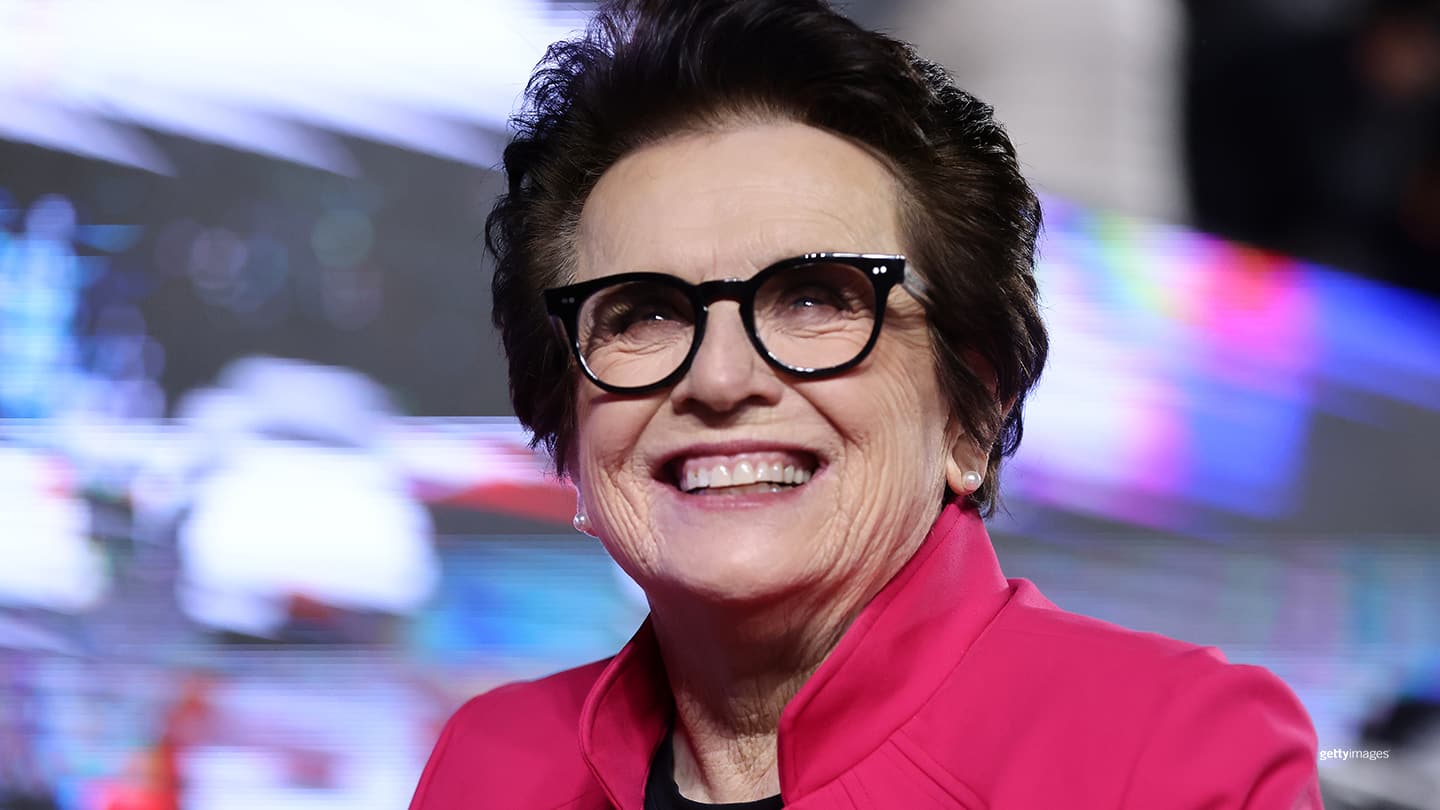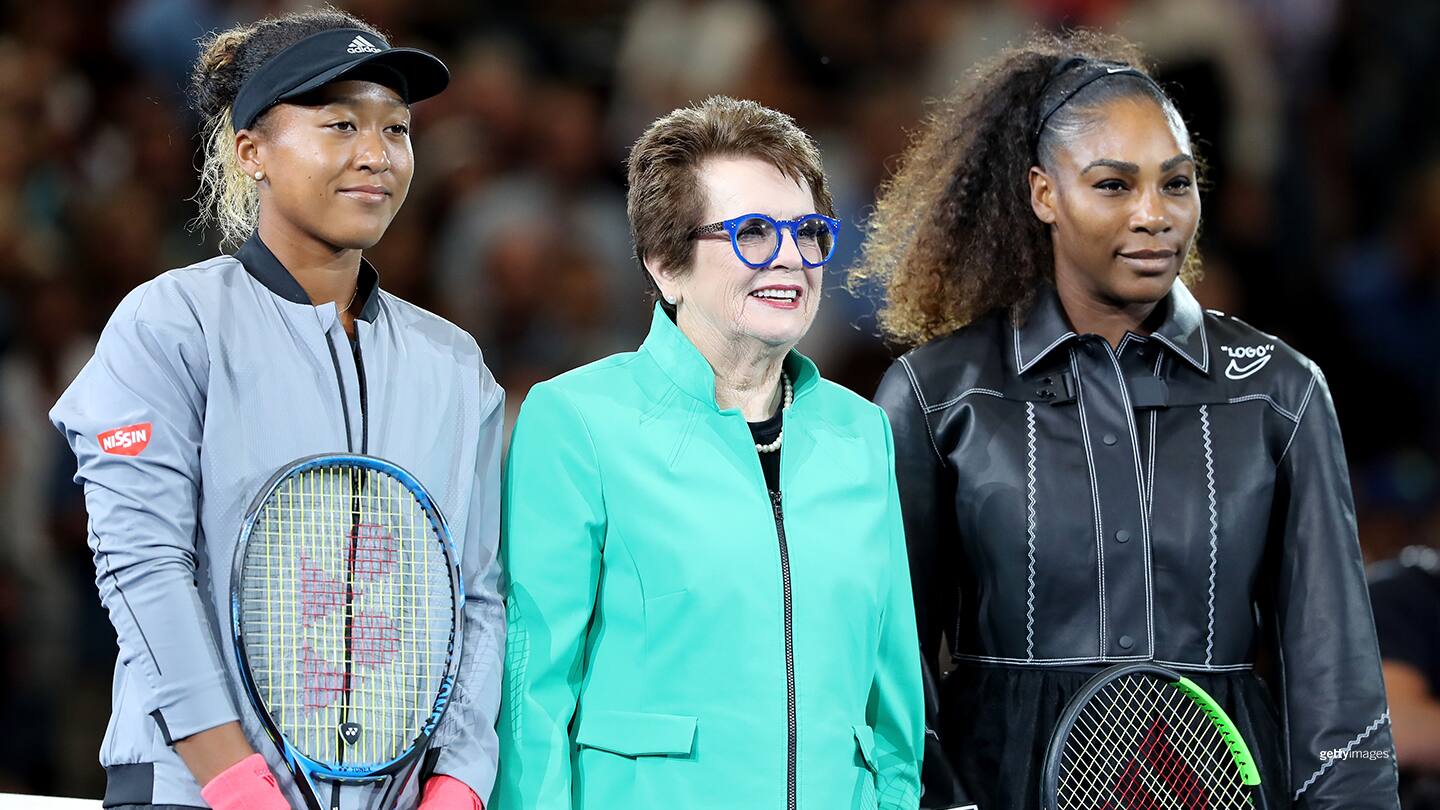
Billie Jean King Spent Her Life Fighting For Equality; Now She’s Headed For The Hall
by Bob Reinert

Billie Jean King looks on during a women's doubles semifinal match at the 2021 Akron WTA Finals on Nov. 16, 2021 in Guadalajara, Mexico.
Billie Jean King was at the height of her tennis career, and yet to achieve her greatest goals, she knew she needed to do something more.
So on Sept. 20, 1973, the in-her-prime King played Bobby Riggs, a self-described male chauvinist and former Grand Slam singles champion, in a televised primetime event at the Houston Astrodome. A major spectacle that was marketed as proof that men were the superior athletes, the showdown drew an unprecedented 90 million viewers. And King, then 29 and already the owner of 10 major women’s titles, delivered.
Her “Battle of the Sexes” defeat of the 55-year-old Riggs — 6-4, 6-3, 6-3 — might not have counted in any record books, but it remains an most iconic moment in the growth and acceptance of women’s sports.
“I thought it would set us back 50 years if I didn’t win that match,” King noted later. “It would ruin the women’s tour and affect all women’s self-esteem.”
That match marked another giant step in King’s lifelong journey to achieve gender equality through sports. Yet it was just one of many important milestones in a career filled with them.
For her many accomplishments on and off the tennis court, King will be inducted Friday into the U.S. Olympic & Paralympic Hall of Fame in Colorado Springs, Colorado. Fittingly, she becomes the first woman to enter in the “special contributor” category amid 50th anniversary celebrations of Title IX, the federal civil rights law that prohibits sex discrimination in schools or other educational programs that receive federal funds.
“I am honored to be among such esteemed company in the #TeamUSAHOF, Class of 2022,” King tweeted after her induction was announced.
Perhaps lost amid her decades of advocacy for women’s sports, gay rights and other social justice causes is that King got her start as one of the most successful and influential tennis players of the 1960s and 1970s. As one of the first generation of players in the sport’s Open Era, when the Grand Slam tournaments began allowing professional players, King racked up 39 major singles and doubles titles in her career, including 20 at Wimbledon.
Even in her prime, though, King was already making an impact off the court.
Her “Battle of the Sexes” came in the same year she won his fifth Wimbledon singles title. A year later, in 1974, she helped founded the Women’s Sports Foundation, which continues to advocate for women’s sports. King was also a founder of the Women’s Tennis Association and the World TeamTennis league, and a leader in various efforts to improve pay for women.
Later, after being outed as being gay — making her the most prominent out athlete at a time when that was practically unheard of, much less broadly accepted — King leaned in to become a leader in pushing for LGBTQ+ rights, too.
Even now, at 78, King continues to be a leader, mentoring a new generation of women who are continuing the same battles she has been fighting for decades.
Although King never played in the Olympic Games, her connection to the movement runs deep.
As the coach of the U.S. Olympic women’s tennis teams in 1996 and 2000, King guided the Americans to four gold medals and a bronze medal. More recently King, who received the Presidential Medal of Freedom from President Barack Obama in 2009, was selected to join the U.S. delegation for the Olympic Winter Games Sochi 2014. She told the Associated Press at the time that she didn’t hesitate at all despite Russia’s anti-gay law.
“It sends a strong message that America is very diverse,” King, who ultimately was unable to attend, citing her mother’s failing health, told the AP. “We are here, and surrogates as athletes and gay athletes. We reflect part of America. Maybe we’ll be a voice for people who don’t feel they can be a voice yet.”

(L-R) Naomi Osaka, Billie Jean King and Serena Williams pose for a photo prior to the women's singles finals at the 2018 US Open on Sept. 8, 2018 in New York.
While King remains active and influential in her advocacy, her voice has been particularly sought out this year as the country commemorates the anniversary of Title IX.
Speaking last month at the Springfield (Massachusetts) College commencement ceremony, King recalled being at the Los Angeles Tennis Club while growing up and seeing all the white faces.
“I asked myself, ‘Where’s everybody else?’” King recalled. “I already knew back then I was a second-class citizen. I knew my sisters of color had it worse than other people.
“But I thought, ‘You know, tennis is global. I have an opportunity to maybe make the world a better place.’ That was my social justice awakening, and it set the course for the rest of my life to fight for equality.”
King told the audience that she’s a huge fan of history.
“Every single person is an influencer, and so many times, we forget that,” she said. “Every one of you is an influencer, and you make history every single day. The more you know about history, the more you know about yourselves.”
Noting the Title IX anniversary, King mentioned a discussion she had in 2007 with former Sen. Birch Bayh of Indiana, one of the law’s architects. He told King that they had nearly omitted the word “activity” from the final text.
“Without that word ‘activity,’ women would not have athletic scholarships,” King said. “Sport is not mentioned at all.”
King then spoke about what it was like to be a female college athlete in the 1960s.
“I was a pre-Title IX student-athlete,” said King, who attended then Los Angeles State College (now California State University, Los Angeles). “I had two jobs to help me handle the financial burden of college, and I thought I was living large.
“Twenty miles down the road, Arthur Ashe had a full scholarship to UCLA, and Stan Smith had a full scholarship to University of Southern California. The three of us went on to become the No. 1 tennis players in the world.”
That scholarship divide between men and women wouldn’t stand, however.
“When Title IX was passed June 23, 1972, all that started to finally change,” King said. “But we had a long way to go.”
King noted that as a gay woman, she didn’t feel comfortable in her own skin until age 51.
“You never really understand inclusion until you’ve been excluded,” King said. “So, don’t let others define you because, believe me, they will try. But don’t you dare let them define you. You define yourself in your life.”
At an event celebrating the Title IX anniversary that was held earlier this month at Gillette Stadium in Foxborough, Massachusetts, King spoke by video conference and emphasized the battles still to come.
“Title IX is always in a tenuous position, so please don’t take it for granted,” King said, according to NFL.com. “That’s why every generation is important, and it’s helped suburban white girls the most.
“So, we need to, in the next 50 years, really, really step it up for girls of color, girls living with disabilities, trans athletes, (the) LGBTQ+ community. These are the things we have to worry about if we’re going to do the right thing in the next 50 years.”
Bob Reinert spent 17 years writing sports for The Boston Globe. He also served as a sports information director at Saint Anselm College and Phillips Exeter Academy. He is a contributor to TeamUSA.org on behalf of Red Line Editorial, Inc.